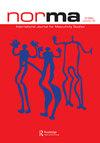Gender studies as the political straw man
IF 1.5
Q2 SOCIOLOGY
引用次数: 0
Abstract
As we are moving further into the third decade of the twenty-first century the ideological tensions, in and around gender studies, including masculinity studies, are increasing and decreasing in parallel. We are currently, and have for quite some time been, under heavy attack from different expressions of anti-genderism, and especially from ethno-nationalist and alt-right movements (see for instance Verloo, 2018). No cease-fire in sight here it seems, but rather a continuously raised tone, and seemingly small prospects for any common understanding, as joint understanding is not the vocabulary of the current ideological war-mongering of the far-right and neo-conservatism. The ideological stalemate seems to be set for some time to come. Gender studies is a prime target for the general neo-conservative and right-wing wave that has turned countries like Poland and Hungary within the EU into illiberal and authoritarian states within a democratic union of member states. Gender studies have taken the form of a political straw man. The ignorant, but recurring and utterly exhausting attacks on gender studies are repeating similar arguments over and over again. The most recurrent argument, in the Nordic context, is that gender studies are preaching that everything connected to gender are social constructions. When we are trying to counter such simplistic arguments, which I personally sometimes try to do in different public media outlets (in Sweden), such as op-ed articles, in public panels, podcasts etcetera, there are always diversions and strategies to avoid listening because there is no substance based in knowledge about what gender studies are, and what kind of knowledge that is being produced. At times, it could possibly be a joint frame of understanding when it comes to, for example, masculinity, vulnerability, and mental health, and in particular suicide rates among men. The latter is a subject I have researched the last couple of years, and where we draw upon a wide range of everyday understandings by ordinary Swedes, which feeds into the research and the findings we present. The findings have even been presented in the Swedish Parliament, in a seminar attended by all political parties, including ‘ethno-nationalists’ and conservatives. In personal interactions, prior to and after the seminar, we managed to agree on a basic understanding on mental health, vulnerability, and masculinity, but in the political discourse I have, however, rarely met any genuine intentions of actually trying to understand what kind of knowledge production gender studies stand for. These misrepresentations are the norm. Typically, a straw man fallacy is when someone takes another person’s argument and distorts it in some kind of extreme way, and then attacks the extreme distortion, as if that is really the claim the person is making. This seems to happen to me and others that are discussing gender and gender studies in an open public debate in different media outlets. It sometimes happens within academia as well, but with less intensity than it happened 20 to 30 years ago. The ‘anti-genderism’, which is official policy in Hungary and Poland, is spreading to other parts of the European continent and beyond in various forms as well. The unifying authoritarian traits of masculinity, political nativism, and populism are surprisingly homogenous, and something that we性别研究作为政治稻草人
随着我们进入21世纪的第三个十年,性别研究(包括男性研究)内部和周围的意识形态紧张也在增加和减少。我们目前,并且在相当长的一段时间内,受到来自反性别主义的不同表达的猛烈攻击,特别是来自种族民族主义和另类右翼运动(例如,参见Verloo, 2018)。这里似乎看不到停火的迹象,而是不断提高的语气,达成共识的可能性似乎很小,因为共同理解不是当前极右翼和新保守主义的意识形态战争煽动者的词汇。意识形态的僵局似乎还将持续一段时间。性别研究是新保守主义和右翼浪潮的主要目标,这种浪潮已经把欧盟内的波兰和匈牙利等国家变成了民主联盟成员国中的不自由和专制国家。性别研究以政治稻草人的形式出现。对性别研究的无知的、反复出现的、令人筋疲力尽的攻击,一遍又一遍地重复着类似的论点。在北欧的背景下,最常出现的论点是,性别研究宣扬的是,与性别有关的一切都是社会建构。当我们试图反驳这种简单的论点时,我个人有时会在不同的公共媒体(在瑞典)上尝试这样做,比如专栏文章,公共小组讨论,播客等等,总是有一些转移话题和策略来避免倾听,因为关于性别研究是什么,以及正在产生什么样的知识,没有实质性的知识基础。有时,这可能是一种共同的理解框架,例如,当涉及到男子气概、脆弱性和心理健康,特别是男性的自杀率时。后者是我过去几年研究的一个主题,我们借鉴了普通瑞典人广泛的日常理解,这些理解为我们的研究和发现提供了依据。这些发现甚至在瑞典议会的一个研讨会上被提出,所有政党都参加了这个研讨会,包括“民族主义者”和保守派。在研讨会之前和之后的个人互动中,我们设法就心理健康、脆弱性和男性气质的基本理解达成一致,但在政治话语中,我很少遇到真正试图理解性别研究代表什么样的知识生产的真正意图。这些虚假陈述是常态。典型的稻草人谬论是指某人将另一个人的论点以某种极端的方式扭曲,然后攻击这种极端的扭曲,就好像这就是那个人的主张一样。这似乎发生在我和其他在不同媒体上公开讨论性别和性别研究的人身上。学术界有时也会发生这种情况,但不像二三十年前那样激烈。“反性别主义”作为匈牙利和波兰的官方政策,正在以各种形式蔓延到欧洲大陆的其他地区和其他地区。男性气质、政治本土主义和民粹主义的统一专制特征是惊人的同质性,这是我们
本文章由计算机程序翻译,如有差异,请以英文原文为准。
求助全文
约1分钟内获得全文
求助全文
来源期刊

NORMA
Social Sciences-Gender Studies
CiteScore
3.00
自引率
14.30%
发文量
23
期刊介绍:
NORMA is an international journal for high quality research concerning masculinity in its many forms. This is an interdisciplinary journal concerning questions about the body, about social and textual practices, and about men and masculinities in social structures. We aim to advance theory and methods in this field. We hope to present new themes for critical studies of men and masculinities, and develop new approaches to ''intersections'' with race, sexuality, class and coloniality. We are eager to have conversations about the role of men and boys, and the place of masculinities, in achieving gender equality and social equality. The journal was begun in the Nordic region; we now strongly invite scholarly work from all parts of the world, as well as research about transnational relations and spaces. All submitted manuscripts are subject to initial appraisal by the Editors, and, if found suitable for further consideration, to peer review by independent, anonymous expert referees. All peer review is double blind and submission is online via Editorial Manager.
 求助内容:
求助内容: 应助结果提醒方式:
应助结果提醒方式:


